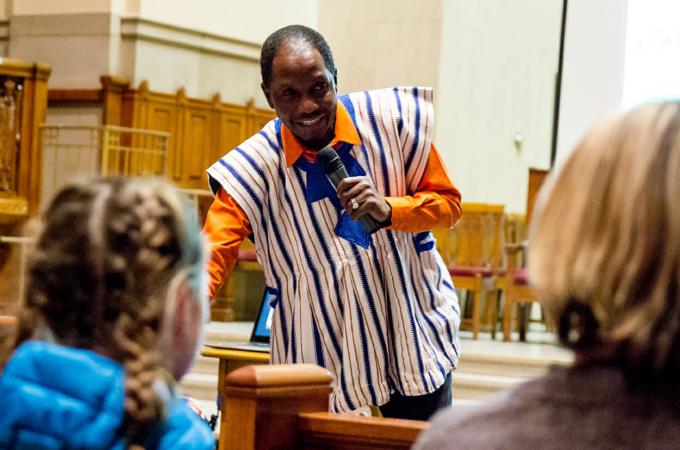Speaker describes impact of CRS Rice Bowl in his home country
WEST ROXBURY -- The woman in the photo stands in the dirt. She's elderly, her face creased as she smiles at the camera. She's holding up a cellphone. It's an older model, without internet capabilities.
The phone, as Jacques Kabore, Partnership and Capacity Building Coordinator for Catholic Relief Services (CRS) Burkina Faso, said, might not look like much to the average American, but to her, it means the world.
"It changed her life. It gives hope," he tells the dozen or so people gathered at Holy Family Church in Roxbury, Jan. 29.
The woman is from Burkina Faso, a landlocked country in West Africa. Kabore is a Burkina native. A highly learned man, Kabore has studied law, microfinance, accounting, micro-enterprise, and project management. Those skills are utilized in his current position at CRS, which sees him coordinate the humanitarian aid organization's many partners in both Burkina Faso and one of its neighboring countries, Cote d'Ivoire.
Kabore was in the U.S. to educate the public about the work he does, and promote CRS Rice Bowl, Catholic Relief Services' annual Lenten faith-in-action initiative. The program calls on people in the U.S. to support the relief efforts of CRS worldwide through prayer, fasting, and donations.
The official international agency of the Catholic Church in the U.S., CRS provides assistance to those in need via programs including emergency response, HIV, health, agriculture, water, education, microfinance, peacebuilding and partnership. Headquartered in the U.S., it maintains a wide reach with offices in the regions of Africa, Asia, Europe, the Middle East and Latin America and the Caribbean.
In Burkina Faso, CRS supports education, healthcare and inclusive economic development, but it is its agricultural programs that have had the biggest impact.
About 80 percent of the country's population relies on farming and livestock rearing to make a living, which usually equates to less than a dollar a day, Kabore said.
The climate is harsh. For months, it won't rain, he explained, creating desert-like conditions and draughts. When it does finally rain, it can rain for months, subjecting the land to flooding. Because of this, most farmers operate on a subsistence level.
The work of CRS is beginning to change that. New crops and farming techniques have been introduced to the region, allowing farms to become more resistant to the changes in climate, Kabore said. Growth has been encouraged with micro-loans, which have allowed some farmers to plant enough crops that there are extra to sell.
That's why the woman in the photo is smiling, said Kabore. With the help of a micro-loan, she had set up a small business selling some of her extra crops, and eventually had earned enough money to buy a cellphone. It gave her freedom, and it gave her hope.
Yes, Burkina Faso is a poor country but, Kabore said, pointing to the woman, "it's not the end of the world."
Addressing the audience at Holy Name Church, Kabore called on people to "do their part" in supporting CRS, and ultimately, the people of Burkina Faso.
Grade-schoolers Matthew Golden and Joey Mitchell, of Holy Name Parish School, were part of that audience.
Speaking to The Pilot, Golden said he felt lucky after hearing Kabore's talk -- "Lucky to have what I have," and lucky to live "in the richest country in the world."
He admired the people of Burkina Faso, he said, for, in the pictures Kabore showed, they all looked happy, "even though they didn't have a lot."
Mitchell shared Golden's sentiments. They seem "really grateful to have what they have," he said.
"I feel like they're strong, that they know what they're doing," he said. He paused for a moment, before saying "they have to stay strong, because it's really hard to live where they are. It's scary."
In the Archdiocese of Boston for only a few days before continuing his speaking tour in other regions, Kabore spoke at a number of parishes and schools, and was interviewed on CatholicTV at its Watertown studio.
One of those schools was Cathedral High School in Boston, where Kabore gave his talk during an all school assembly, Jan. 29.
In a statement provided to CRS, Feb. 12, Philip Dujardin, Cathedral's theology department chair, said Kabore was engaging and thought-provoking in his talk.
"The students appreciated his energy and he helped us all to see that as a Catholic school, our mission is to share in meeting the needs of our brothers and sisters around the world," he said.



















